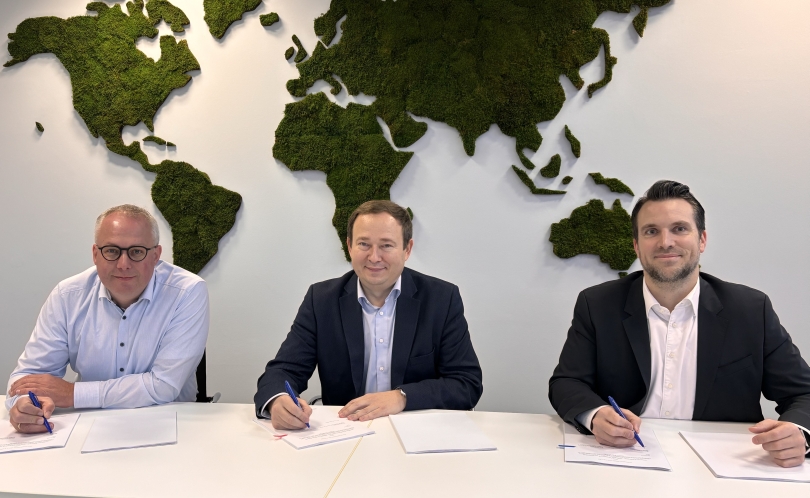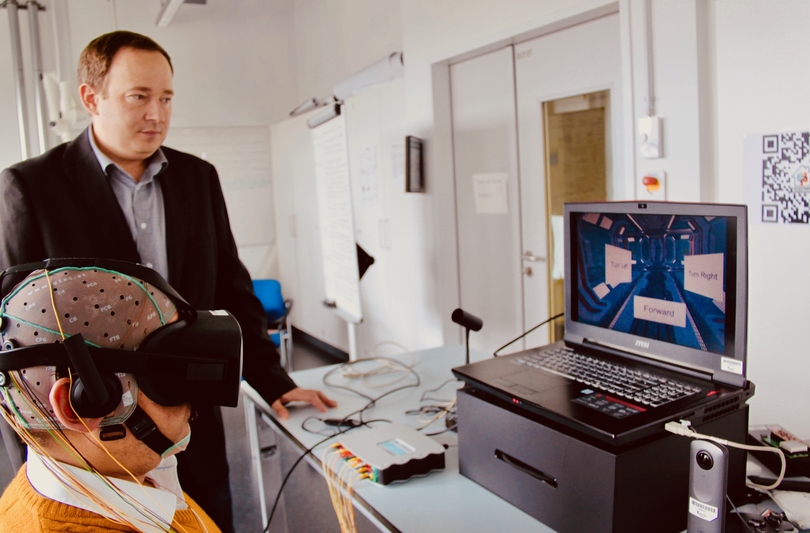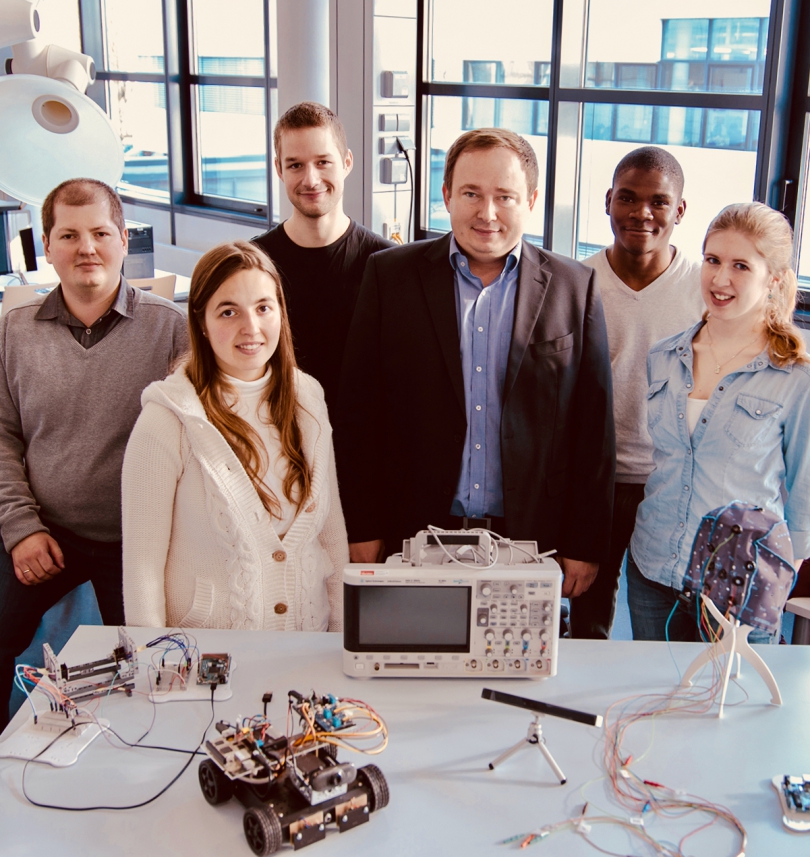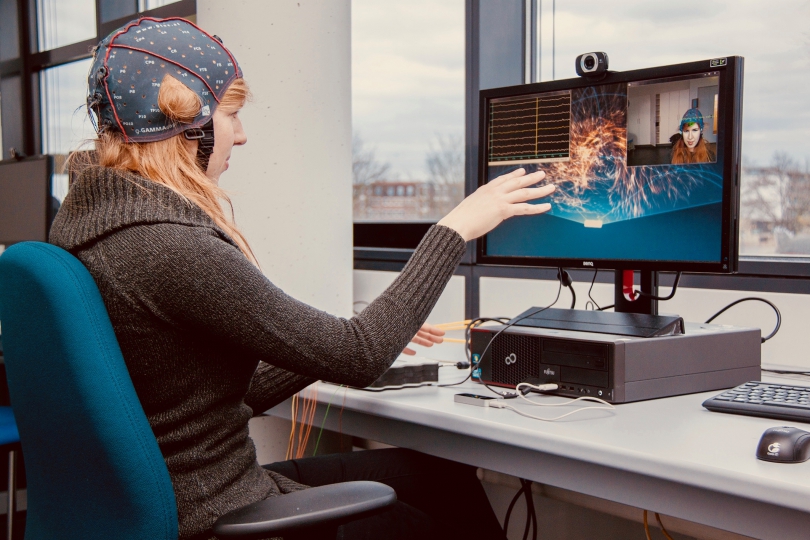EU Marie-Curie DN DONUT
Brain-computer interfacing (BCI) provides not only new opportunities to assist paralysed individuals but also an exciting outlook on how humans will interact with technology in the future. Despite the successes that even reached the media, paradigms and technology are still being actively developed. This is even more the case when taking BCI technology out of the lab. The MSCA-funded DONUT project seeks to establish a doctoral network (DN) focused on paradigms, neural prostheses and brain research, serving as a catalyst for new researchers and EU partners seeking entry into the BCI domain.
Leveraging its collective expertise, the DN aims to train 10 doctoral candidates, enabling them to address the intricate challenges of BCI research. Moreover, the network will foster collaboration and facilitate the maintenance of connections among its members. The DONUT project (European Doctoral Network for Neural Prostheses and Brain Research) aims to address various challenges in the field of BCI research through the education and training of doctoral candidates (DCs). The areas of training include improving the quality of life of locked-in patients, post-stroke rehabilitation, development of commercial products based on BCI and EEG technologies, early detection of Alzheimer‘s disease using EEG brain recordings, and BCI research for everyday use. It therefore is in line with the UN Sustainable Development Goals “Good Health and Wellbeing”, “Quality Education” and “Gender Equality”.

DONUT
Modern technologies that enrich and simplify people's everyday lives are gaining more and more influence. Brain-computer interfaces, sometimes called brain-machine interfaces or neuroprostheses, capture brain signals, analyze them, and translate them in real time into instructions that a computer can understand. These instructions can then be relayed to devices or processed directly to perform desired actions. In this way, direct communication is made possible between the brain and the object to be controlled, such as speech computers or a robot.
Behind the acronym DONUT ("European Doctoral Network for Brain Research") is a one-year research project that addresses the broad spectrum of this research area and, among other things, prepares a joint application within the framework of the European MSCA DN 2022 funding program. After it was recently possible for the first time to achieve complete inclusion of all test subjects for the BCI system (all study participants were able to successfully operate the system), further interesting questions have arisen on this basis, which are to be addressed in the European doctoral student network.
On the one hand, the already existing EU-cooperations of the Rhine Waal University of Applied Sciences shall be further developed and consolidated during this project. On the other hand, innovative impulses shall be set by the broadly diversified know-how of the project partners and their cooperation, as well as the further development of the BCI-systems shall be advanced in a groundbreaking way. To this end, various visual stimulation patterns, modern signal processing algorithms and the use of Deep Learning, among other things, will be further investigated. In this way, it is possible to further improve the BCI system and ideally adapt it to the everyday life of the user. In case of a positive funding decision on the European level, the scientific cooperation of the project partners will be deepened even further and will certainly lead to a large number of successful cooperative PhDs.

Start - End:
01.05.2022 - 30.04.2023M3S
From your pocket to your own four walls: In times of smartphones and smart homes, communication between man and machine is becoming increasingly simple and direct. Haptic interfaces are more and more being replaced by non-contact interfaces, such as speech or facial recognition systems. For a successful integration of such interfaces into everyday use, the underlying systems have to be profitable for everyone and without long training phases. In the M³S project, we develop human-machine interfaces suitable for everyday use, in which mainly EEG data, i.e. brain signals from users, are used to control computers and external devices. These direct interfaces between brain and machine are also known as BCI, short for Brain-Computer Interface.
In our systems, various methods are used, with which mechanical control commands can be derived from brain signals. Most methods are based on a visual stimulation of the eye: individual light stimuli, continuously flashing signals or pseudo-random stimulation patterns each produce their own, characteristic responses in the visual cortex of the brain. These naturally occurring stimulus responses can be measured noninvasively using electroencephalography (EEG) and converted to computer instructions in real time by the BCI software. By assigning different stimuli to different boxes on a screen, it is possible to read from the brain's streams which box the user is concentrating on and a specific control signal is forwarded to the machine.
We expect that in the future BCIs will play a major role in various industries, such as the gaming industry or the automotive industry. In order to increase the attractiveness of BCIs for these fundamentally different areas, different core requirements must be met and further developed. For manufacturing industries, these are essentially precision and reliability. In other areas where personal safety is not as important, other factors such as adaptivity, immunity to interference, speed, user acceptance and ease of use are more important.
In order to meet the requirements of the mentioned industries, we have set ourselves several main goals. One of these goals is the new and further development of BCI hybrid systems. Such hybrid systems, in which BCIs are coupled with other control systems, such as eye or muscle control, are often more efficient, faster, and more accurate than the individual systems - major benefits to a system in everyday use. Another goal is the further development of existing training and classification algorithms of the software for the improvement of adaptivity and immunity to interference. Finally, we try to increase user acceptance and ease of use by reducing the number of electrodes and using mobile BCI systems. Higher mobility also means that users are not locally limited by the system. In computer games, this allows for greater freedom of movement, and in the industrial environment, it is easy to change workstations.
In order to achieve the goals set, the M³S project is a cooperation with several partners from research and industry: Under the leadership of Prof. Dr.-Ing. Ivan Volosyak we work together with the industrial partners polyoptics GmbH as well as MediaBlix IIT GmbH and the University of Bielefeld. The project partners contribute essential components and know-how from the fields of optoelectronic production, eye movement control and algorithm optimization by means of machine learning.
In addition, we actively integrate our research into teaching. Thus, in connection with this research project theses are carried out by students. In addition, student assistants support our research (if you are interested in an SHK job, please contact the project manager).
The project is funded by the European Regional Development Fund (ERDF) and the state government of North Rhine-Westphalia (grant number IT-1-2-001). The human volunteer trials included in the project were reviewed and approved by the Ethics Committee of the Medical Faculty of the University of Duisburg-Essen.

Start - End:
15.05.2017 - 30.04.2020BCI@Home
Moving everyday objects with your mind? What was once science fiction has now become reality thanks to modern brain-computer interface (BCI) systems. In the BCI@Home project, we are exploring how to best connect brain and computer in order to improve the lives of people with limited physical abilities. This interface, for example, would allow patients to communicate without speech and even control robots solely through brain activity.
Due to degenerative illness or aging, many people are limited in how they can interact with their environment. The BCI system offers its users the opportunity to steer communication devices and assistive technology using only their brain waves.
Our system uses so-called "SSVEPs" (steady state visual evoked potentials). These are electric potentials that occur in our brain when our eyes perceive visual stimuli of certain frequencies. In our experiment, we use flickering boxes on a computer screen to trigger these SSVEPs in the visual cortex of the human brain. The boxes on the screen flicker at different frequencies from 6 to 90Hz. Each box is assigned to a certain command or letter so that the user can activate that command or spell out a word just by glancing at the respective boxes. This allows BCI technology to be used to control assistive technology such as robots, remote controls or communication systems.
Our BCI@Home project, led by Prof. Dr.-Ing. Ivan Volosyak, is a collaboration with our industrial partner polyoptics GmbH. Our common goal is to make a more user-friendly home environment, particularly for people with physical impairments.
We are also using this project to link research and teaching. Students can write their theses in the context of the research project, for example. In addition, student assistants actively support our research efforts (please contact the project lead if you are interested in joining our team as a student assistant).
The project is supported financially by the European Fund for Regional Development (ERDF) and the North Rhine-Westphalia State Government (grant number: GE-1-1-047). The project includes a study which has been approved by the Ethics Committee of the Medical Faculty of the University of Duisburg-Essen.

EBCI
The goal of the project “EEG-based brain-computer interfaces for use in health care (EBCI)” was the development of new approaches in the field of SSVEP-based brain-computer interfaces (BCI). A BCI is a system that allows people to communicate without moving. It measures the brain activity (for example, via the non-invasively measured electroencephalogram (EEG)) and converts them directly into computer commands, which can control a computer or some other assistance system. This tool can be the only way of communication for severely disabled users.
Due to the demographic changes and medical advances our society is getting older. According to estimates by the Federal Statistical Office, 22 million people in Germany will be over 65 years old already in 2030. Further calculations show that Germany will lose a fifth of the population, or approximately 17 million inhabitants, by 2060. Even every third person will be aged 65 or over then. This will also increase the number of people who are dependent on the help of relatives or caregivers due to concomitant diseases of advanced age. Many of these people remain cognitively completely healthy or have only mild to moderate sensory deficits. Patients with cerebral palsy, after a stroke, brain or spinal cord injuries are typical examples of groups that are excluded from active participation in social life by their disease. Most of these people would love to live independently and secure in their homes and be mobile and stay in touch with other people.

ABCI
The effects of ageing present physical handicaps that all-too-often prevent elderly people from maintaining relationships and actively participating in social life, even when they can live safely and independently in their own homes.
Modern communication technologies could help elderly people with physical impairments if they provided special interfaces that worked independently of the persons' limitations.
The project "Brain Computer Interfaces suitable for daily use" pursues a solution-based approach for the development of appropriate communication technologies. Applications of this system might improve quality of life for physically handicapped elderly persons and their families.
Our approach concentrates on designing a lightweight adaptive system, based on a Brain-Computer Interface (BCI) using steady-state visually evoked potentials (SSVEPs). The system will be modular and expandable through the acquisition of additional control signals, e.g. magnetic or tongue control.
The desired solution should improve the reliability of BCI signal detection by exploring new methods for signal processing and handling, and by simplifying the mounting of EEG (electroencephalogram) electrodes. A new BCI system could be deployed where additional channels of communication between people and their environment are found to be beneficial. Combining a cost-effective BCI with a low-cost integration of the newly-developed BCI module into existing systems should result in increased sales.
The results of the project will be tested on relevant study groups as a demonstration to potential manufacturers and users.





